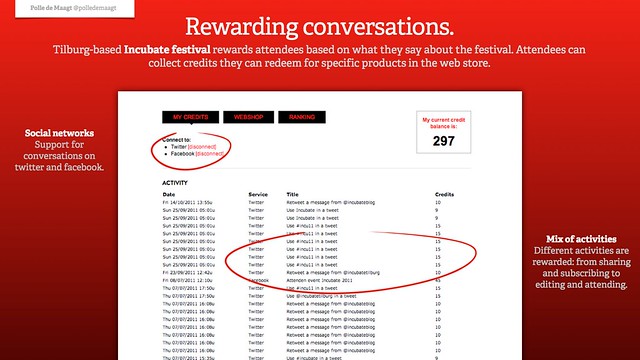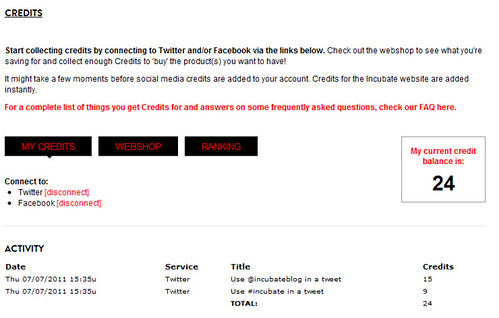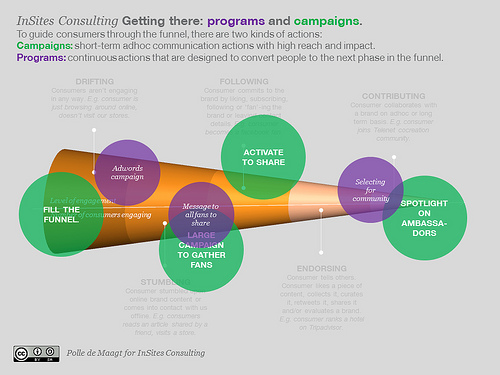Some 3 years ago, I had a salad together with a friend of mine in a random restaurant in Amsterdam. We both loved it so much (and were so twitter-addicted) that we shared it on twitter, for others to see and maybe even visit the venue to have the same salad. We were sharing stuff because we thought it was worth sharing with our friends. But in the meanwhile, we were advertising the restaurant. Which made us think: Shouldn’t we get a discount on the salads for sharing this with our twitter followers?
That’s pretty much the basic thought behind a ever growing movement of social currency programs (or: personal affiliate programs).
NBC started a while a go with NBC Fan-it, an affinity game that works a lot like your credit card rewards or frequent flyer program by giving you a chance to earn real rewards by watching, sharing and interacting with your favorite NBC shows (more here).
Today, Incubate.org started to do the same for their (offline) event, an annual celebration of independent culture in Tilburg, the Netherlands. They named it Loyal Class and it rewards festival visitors for sharing content about the festival. Incubate’s ubergeek Joost Heijthuisen explains: “Society is transforming from relational to transactional, from conversion to conversation. Traditional credits programmes reward conversion: if you buy something you get something. They are based on customers collecting credits. In Loyal Class we don’t primary focus on sales. Sales eventually comes from conversation. That’s why we focus on dialogue. For us it’s not only important to give something back. We can also track what we’re doing.”
Consumers connect their twitter and/or Facebook account to the Incubate festival website and instantly start earning credits for sharing content (which they can redeem for items in the Incubate store). “Loyal Class is a very easy system to use. You can register with your Facebook or Twitter account. We already have quite an active community. The key factor is that we’re well connected with our via our personal social media accounts, our blogs and our website. And people are already talking about us on social media and participating on our website. By giving this a kickstart with Loyal Class it’s not only working in a technical way, but also in a very social way.”
Here’s the dashboard for my account, to give you an idea of how it looks and works:
I am really excited about the concept, but guess there are several think to take into consideration
- Brands should manage expectations to not give consumers the feeling they are bribed to talk.
- Rewarding conversations should be relevant and should definately not feel like entering a socialmedia version of a lame loyalty program. Maybe it’s a good thing to adopt some elements of random acts of kindness.
- Users should adopt their own standards on over-sharing and over-promoting. That you can earn points shouldn’t mean you start spamming your friends with content.
Any thoughts?
By the way, it isn’t the first time that Incubate is leading the way in engaging consumers. In 2009, they launched The Social Festival Model, a method to stimulate organizational co-creation using a free application.




3 comments
To me, it’s turning convesation management into traditional (=push) advertising. It’s not about acting remarkable (making the best salad ever) but about paying your media (=Worth-of-mouth).
Hoping that users will adopt their standards is naïve.
Your next tweets, blogposts about Incubate.org will be less credible/usefull for me than your tweets, posts about communication, social media, tips&tricks, salads, advertising…(=non-sponsored ones, which are higly appreciated btw). If people tweet about a remarkable salad they will also tweet about a remarkable festival without being paid for it.
Dieter, I totally get your point and I totally agree.
Peeter Verlegh (Erasmus University Rotterdam) did a lot research on ‘stimulated’ WoM together with companies like Buzzer.nl (the Dutch equivalent of The InSiders).
There is a delicate balance, but there IS a balance there. The balance between being a genuine brand ambassador and getting recognition for that and being a sell-out who will promote anything for money 🙂 A lot of blogs already get paid/supported by brands. Does that make them less credible? What about television shows? What about journalists that go to press events or press trips?
I get your point. Only thing is to find a balance. And I’m looking for that, hope to join forces with you 🙂
Mww, if we would encourage people to collect credits it would be the case I think. But this is not pre-sales but after-conversation. We just want to be good to the people that are good to us.